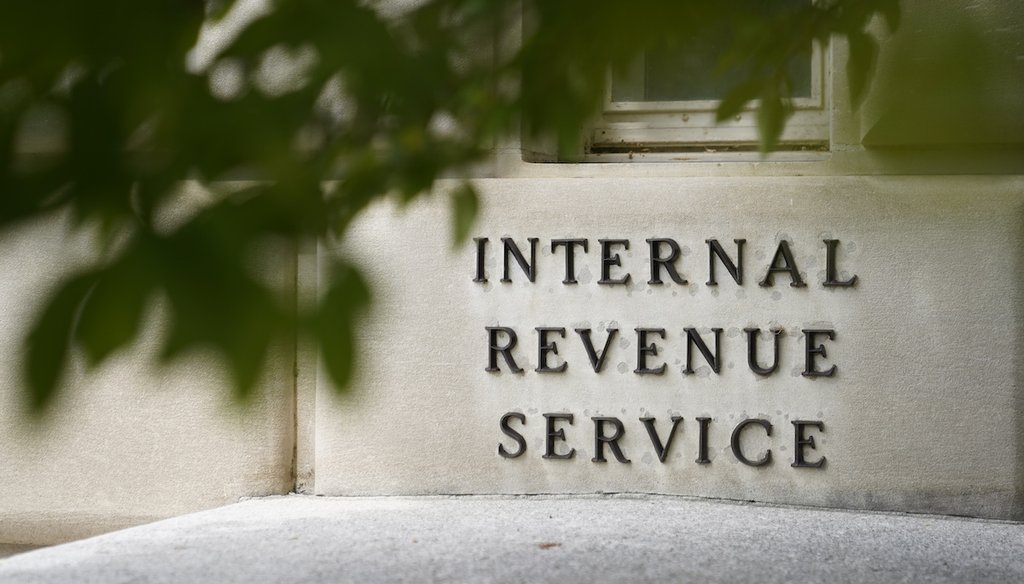Get PolitiFact in your inbox.

A sign is displayed outside the Internal Revenue Service building May 4, 2021, in Washington. (AP)
Johnson’s claim on IRS audits of mostly low wage earners is in the ballpark
If Your Time is short
-
Data shows that lowest wage earners were audited by IRS at a rate of 13 per 1,000 for the 2021 fiscal year.
-
Under the analysis by a Syracuse University-based institute, everyone else was audited at a rate of 2.6 per 1,000
-
So, Johnson and others correctly note that gap.
-
But that’s not the final picture, as audits are not all begun in the year in which taxes are filed. The number of audits will grow, and the proportion may shift.
The Inflation Reduction Act, signed into law Aug. 16, 2022, by President Joe Biden, has many provisions aiming to lower drug costs, address the climate crisis, reduce the deficit, and ask large corporations to pay a greater share of taxes.
But one aspect of the Democratic plan has sparked some of the biggest headlines: $80 billion over 10 years to beef up the Internal Revenue Service. Here’s a sample of unfounded and debunked claims:
A ‘Delta Force’ seized a shipment of weapons headed to the IRS, a TikTok video claimed. PolitiFact National rated this Pants on Fire.
The government is arming up the IRS because "Joe Biden is raising taxes and disarming Americans," U.S. Rep. Matt Gaetz, R-Fla., said. PolitiFact National rated this False.
"Democrats' new army of 87,000 IRS agents will be coming for you — with 710,000 new audits for Americans who earn less than $75k," House GOP leader Kevin McCarthy insisted. PolitiFact National rated this Mostly False.
In Wisconsin, meanwhile, Republican U.S. Sen. Ron Johnson weighed in Aug. 7, 2022, the day the Senate approved the measure, with a news release citing a litany of grievances with the IRS and this claim: "Last year, the IRS audited Americans earning less than $25,000 a year at five times the rate of other groups."
According to Democrats and the White House, the Inflation Reduction Act money for the IRS is meant to improve tax compliance enforcement of the wealthiest in the nation. So, Johnson’s claim caught our attention.
Is he right?
Two sides point to the same study to make their points
When asked for backup, Johnson spokesperson Alexa Henning pointed to an April 13, 2022, letter from U.S. Sen. Elizabeth Warren, D-Mass., a member of the Senate Finance Committee, and U.S. Rep. Judy Chu, D-Calif., a member of the House Ways and Means Committee. The letter was sent to Secretary of the Treasury Janet Yellen and Internal Revenue Service Commissioner Charles Rettig.
The letter — from two prominent Democrats, no less — accuses the IRS of targeting low-income Americans for tax audits.
After noting the lawmakers are working to secure more money to expand audits, the letter says: "The most vulnerable taxpayers should not shoulder the burden of insufficient IRS enforcement funding simply because they require fewer resources to audit."
Keep those thoughts in mind as we move ahead.
At the core of the letter — and therefore of Johnson’s claim — is an analysis of tax data from the 2021 fiscal year by Syracuse University’s Transactional Records Access Clearinghouse (TRAC), a nonpartisan, nonprofit data research center.
Here is what the analysis found:
What’s behind this?
The March 8, 2022, TRAC analysis says the "IRS accomplished over 650 thousand audits last year by jacking up its already high reliance on ‘correspondence audits’ — essentially a letter from the IRS asking for documentation on a specific line item on a return. All but 100,000 of the 659,000 audits were conducted with these letters through the mail."
Indeed, in the 2021 fiscal year, that sort of audit accounted for 85% of all audits, up from about 80% in the previous two years.
Featured Fact-check
The analysis noted a similar phenomenon occurred more than 20 years ago, amid a cutback in IRS staff. In other words, with less staff, the most simple audits continue, while other more complex audits fall off.
A limitation in the IRS’ ability to audit millionaires is the availability of IRS revenue agents, a particular class of investigators.
"Only this class of auditors, given sufficient training and experience, are qualified to examine complex tax returns — the types of returns typically filed by high-income individuals and large-scale businesses," the analysis states.
When asked about Johnson’s claim, IRS media relations chief Karen A. Connelly referred PolitiFact Wisconsin to the March 17, 2022, congressional testimony from Rettig. In it, Rettig called the TRAC findings "absolutely 100% false" and said he was "tired of having to deal with this issue."
"We audit high-income taxpayers more than any other category in the Internal Revenue Service," Rettig said. "Taxpayers reflecting over $10 million of income are audited at a rate exceeding 7%. Taxpayers at the $25,000 level, which is primarily — the earned income taxpayer would be the only people we would look at, are audited at 1.1%."
According to TRAC, Rettig was referring to numbers from 2016. They argue that makes their own numbers more up to date.
But that misses an important point.
The IRS does not have to initiate audits in the same year returns are filed. So, as years pass, and more audits are started, the picture changes.
"Under the IRS’s definition of the audit rate, the 2016 figure was the most current complete data," said Janet Holtzblatt, a senior fellow at the Urban-Brookings Tax Policy Center.
Holtzblatt said audits of 2016 tax returns would have begun, at the earliest, in 2017. So at the time of the preparation of the 2020 Data Book, the audit data for 2016 returns were the most recent year outside the statute of limitations for audits. So, it’s the total number of audits possible for 2016 returns.
"Data for a later year would not be complete because the IRS could still be opening up audits for that year. That is, by the IRS definition, the 2019 audit rate would not reflect all the audits that would eventually be done on 2019 tax returns."
So, all of that leaves us in an interesting spot.
In arguing against a bill that provides more money to do more audits of high-income individuals, Johnson cites the same statistics as those calling for the increased spending. Fair enough. And those numbers do refer to "last year."
But, under the audit process, they are not complete. The numbers will only rise — and the proportions could change — as more audits are begun and completed.
That means it’s not as simple as Johnson suggests.
Johnson said "last year, the IRS audited Americans earning less than $25,000 a year at five times the rate of other groups."
That, well, tracks with the TRAC data — and lawmakers on the other side of the issue have cited the same information in making their case for the bill. But both sides are missing a key point: Audits are not all begun instantly, so at best the figures cited are preliminary ones.
They will change, and the proportion may well shift, as time passes and more audits are started and completed.
In other words, the statement is accurate but needs clarification or additional information.
That’s our definition for Mostly True.
Our Sources
Twitter Ron Johnson Aug. 7, 2022
Email TRAC, Aug. 17, 2022
Email Janet Holtzblatt, Urban-Brookings Tax Policy Center
Ron Johnson news release "Democrats are as detached from economic reality as they are from the truth," Aug. 7, 2022.
The White House "By the Numbers: The Inflation Reduction Act," Aug.15, 2022
PolitiFact "A ‘Delta Force’ seized a shipment of weapons headed to the IRS,’ Aug. 8, 2022
PolitiFact "Kevin McCarthy’s mostly false claim about an army of 87,000 IRS agents," Aug. 11, 2022.
PolitiFact "No, weapons headed to the IRS weren’t seized by the military," Aug.11, 2022
PolitiFact "No, Biden is not arming up the IRS with guns and ammunition," Aug. 12, 2022
Elizabeth Warren "Warren, Chu Urge IRS to "Move Swiftly to End the Targeting of Low-Income Americans" for Tax Audits, April 13, 2022
Syracuse University Transactional Records Access Clearinghouse (TRAC) "IRS Income Tax Audits 2021," March 8, 2022
Syracuse University Transactional Records Access Clearinghouse (TRAC) "IRS Continues Targeting poorest families for more tax audits during 2022," March 29, 2022
National Taxpayer Advocate 2021 Annual Report to Congress
Ways & Means Committee "IRS Commissioner Rettig on the 2022 Filing Season," March 17, 2022
The Washington Post, "Senate approves Inflation Reduction Act, clinching long-delayed health and climate bill," Aug. 7, 2022
TRAC IRS Continues Targeting Poorest Families for More Tax Audits During FY 2022 (syr.edu), March 29, 2022
TRAC Letter to The Honorable Charles P. Rettig Commissioner of the Internal Revenue Service, March 21, 2022.
Browse the Truth-O-Meter
More by D.L. Davis
Johnson’s claim on IRS audits of mostly low wage earners is in the ballpark
Support independent fact-checking.
Become a member!
In a world of wild talk and fake news, help us stand up for the facts.





















































